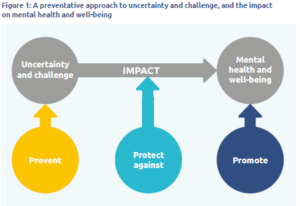Better protecting the health and wellbeing of our fishing communities, in light of Brexit
The UK has left the European Union, yet there are still considerable uncertainties for the fishing industry. Such uncertainty, alongside battling a pandemic, can have a significant impact on the health and wellbeing of our fishermen, their families and communities.
Building resilience in the fishing sector in Wales is a collaboration with Public Health Wales and the Mental Health Foundation, and brings together views from fishing industry support organisations and fishermen on the current challenges and approaches to building resilience in Wales.
Dealing with uncertainty and challenges, and sources of support: views in Wales
When asked to reflect on the uncertainties and challenges facing fishing communities in Wales, people we spoke to identified many long-standing issues. These issues have been exacerbated by Brexit and the COVID-19 pandemic.
These local insights into the impact on health and wellbeing have helped us to map organisations across Wales that offer support and advice tailored to fishermen. We also considered the transferability of a number of international programmes supporting the health and wellbeing of fishermen and their families.
Bringing together this evidence alongside stakeholder views helped us to co-produce a framework for action to:
- prevent uncertainty or challenge
- protect against the impact on mental wellbeing
- promote health and wellbeing amongst fishing communities in the longer term

What are the solutions?
In order to prevent and address uncertainty it was clear that we need to develop a shared vision for a sustainable and viable fishing sector in Wales, highlighting its value as a natural resource supporting the aims of the Well-being of Future Generations Act (Wales). This approach should also be accompanied by practical solutions for business management and regulatory processes, and practical actions to protect against anxiety and stress. In summary we need to:
- Co-produce policies and a viable vision for the future of Welsh fishing with fishermen
- Champion the Welsh fishing sector and promote Welsh produce
- Streamline the administrative and regulatory processes
- Ensure provision of financial and business support extends to the wider fishing family
- Ensure visible enforcement of regulations
Actions specific to promoting mental health and wellbeing amongst fishermen and fishing communities include:
- Supporting a change in fishing culture to address the stigma associated with seeking advice or support for business or health challenges.
- Developing and testing approaches to increase mental health awareness.
- Making sure fishermen have better access to health and wellbeing services in partnership with local providers so health programmes reach the most vulnerable.
- Encouraging multi-agency partnerships; including local health care providers, industry experts and welfare agencies.
- Working in partnership with the fishing communities to build on local knowledge and connections to develop support and enable better engagement with the fishing communities.
This report provides a framework to take into consideration the wellbeing of fishing communities within the approaches to economic and health challenges facing the UK. It presents an opportunity to innovate to better address mental health and wellbeing amongst fishing communities.
